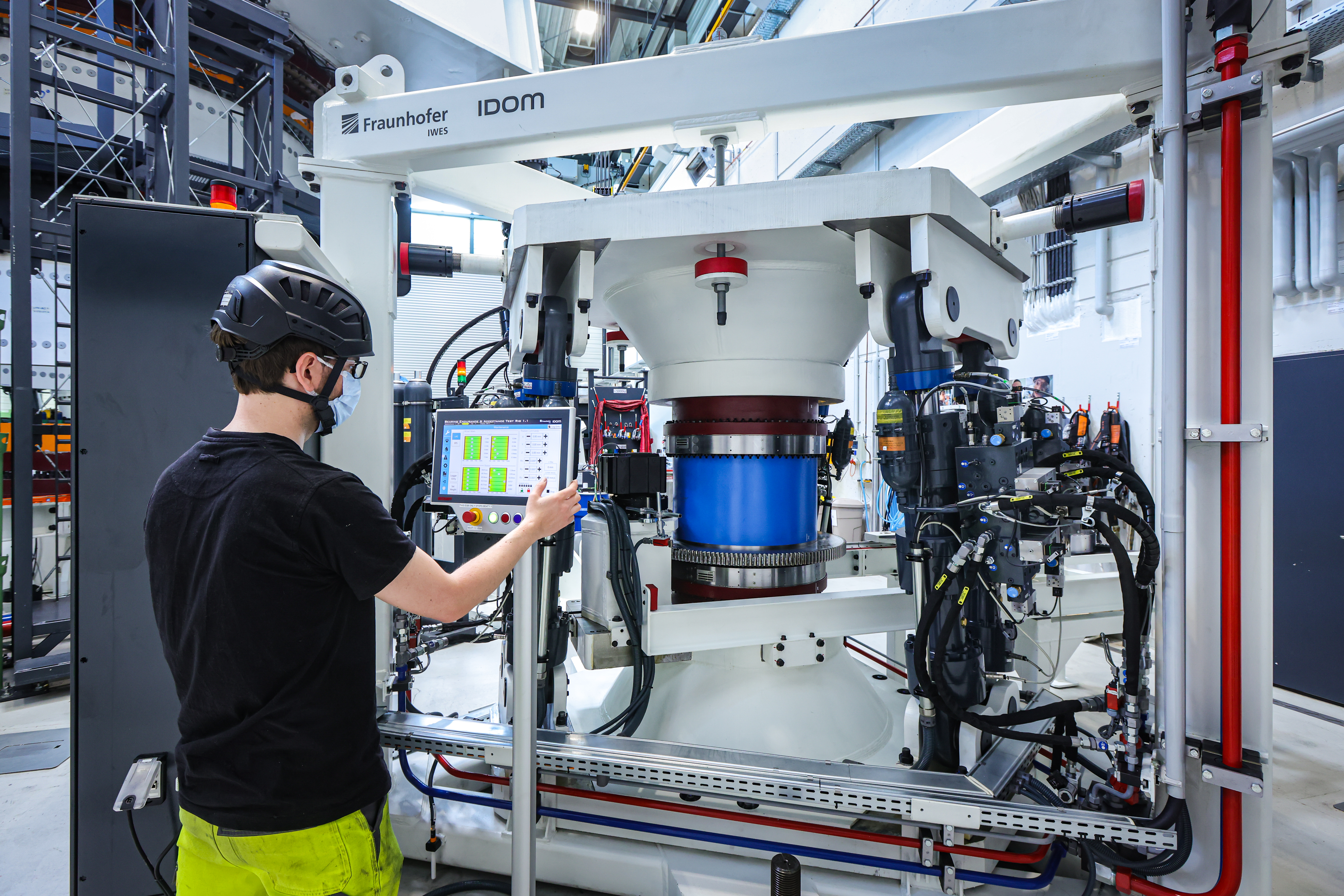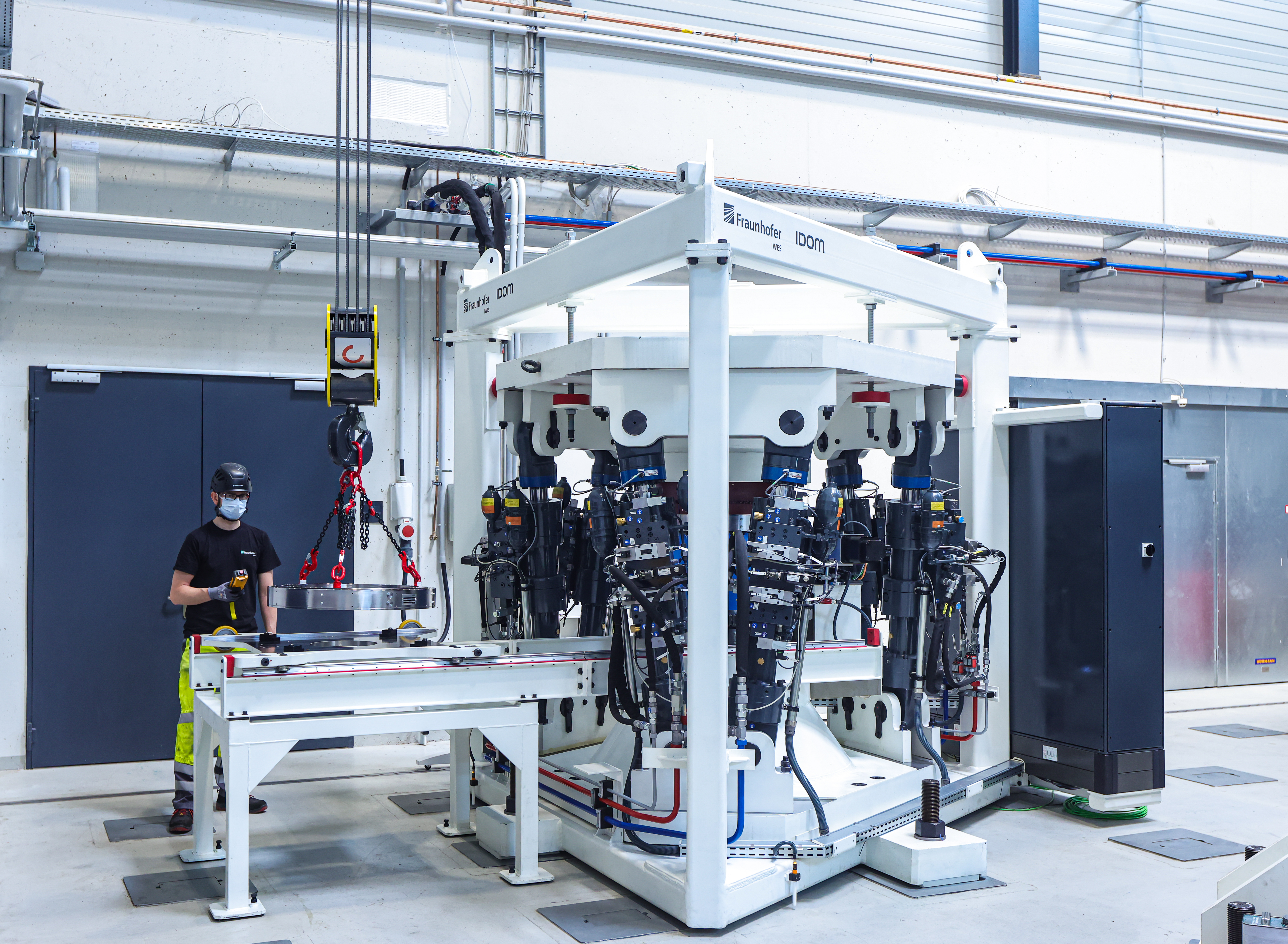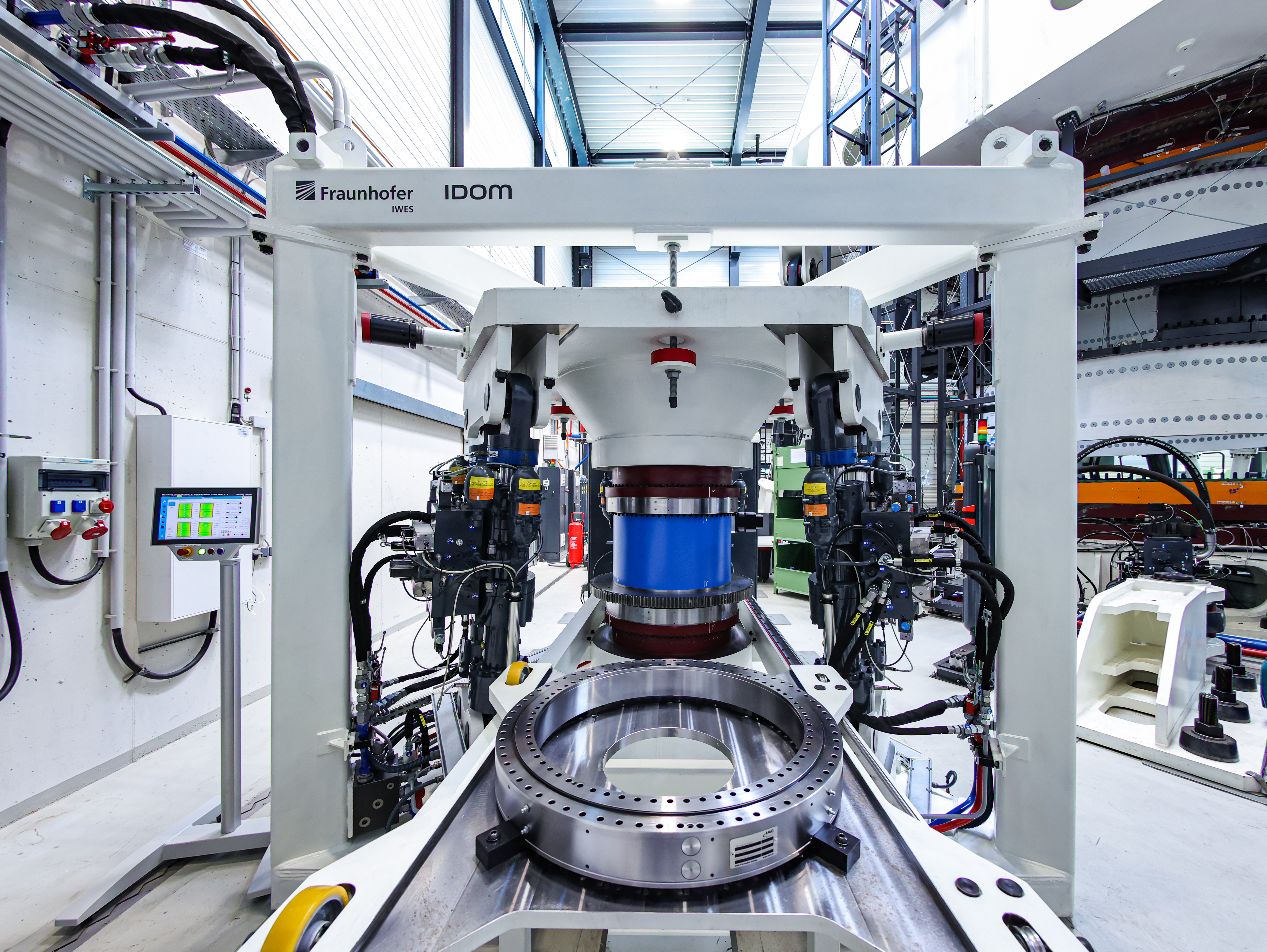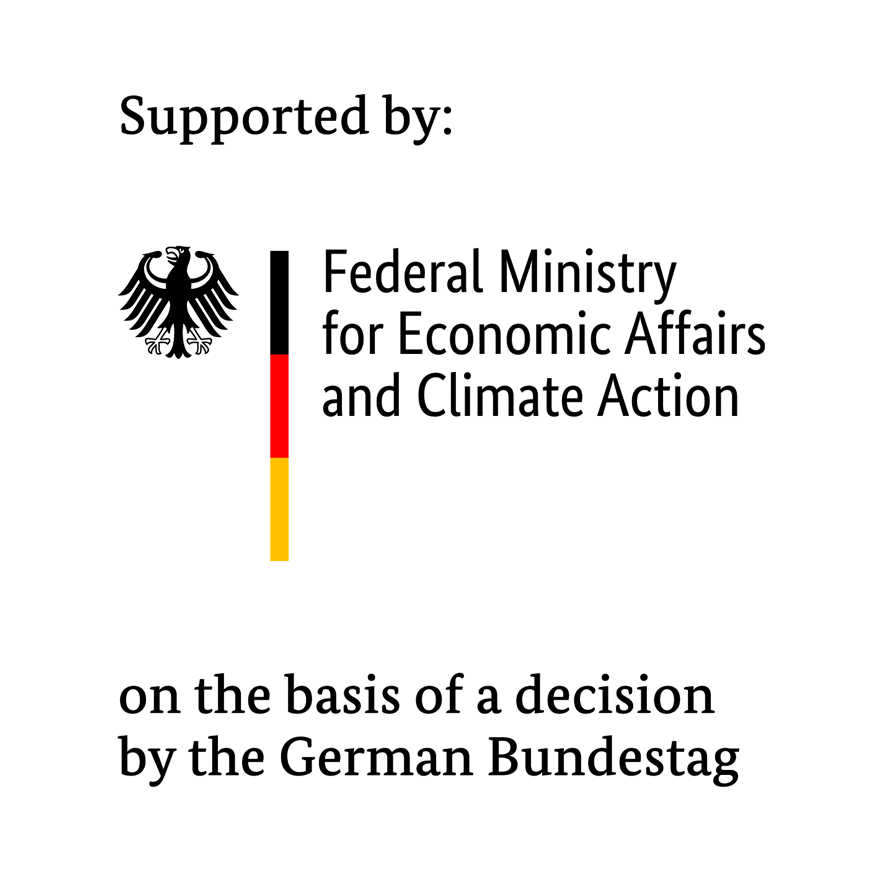Fraunhofer IWES puts further bearing test rig into operation
The Fraunhofer Institute for Wind Energy Systems IWES has put the new BEAT1.1 (Bearing Endurance and Acceptance Test) facility into operation now. As part of the iBAC (Intelligent Bearing Amplitude Control) research project, funded with €2.15 million by the German Federal Ministry for Economic Affairs and Energy (BMWi), Fraunhofer IWES is testing 100 small-scale rotor blade bearings together with the project partners ENERCON, Dataletics, and IMO. The test results will be employed to create a database that can be used to develop methods for advanced pitch control and a condition monitoring system for blade bearings assisted by artificial intelligence (AI). This should make it possible not only to achieve an optimal energy yield, but also to increase the system service life and optimize the operating conditions of the blade bearings.



The rotor blade bearings of a wind turbine are exposed to extreme loads and they are operated under conditions which are less than ideal for roller bearings in order to achieve the optimum energy yield. The oscillating operation result in adverse lubrication conditions between the rolling elements and bearing raceway, which can result in damage and failure of the blade bearings and, in turn, yield losses and repair costs for the operators. Therefore, the aim of the three-year project is to develop an intelligent condition monitoring system (CMS) and combine it with an advanced control strategy in order to protect the blade bearings on the one hand, and, at the same time, optimize the expected energy yield and service life of the wind turbine.
“As part of the iBAC research project, we are developing solutions in cooperation with our project partners to protect rotor blade bearings from damage and, simultaneously, ensure optimal operation of wind turbines. We are combining our tests of the small-scale roller bearings with simulations of the entire wind turbine and, in doing so, aim to find an optimal compromise between bearing damage, energy yield, and the loads on the wind turbine. We use the data sets obtained from our tests to characterize the wear behavior of oscillating blade bearings and, at the same time, use them to train the AI-assisted blade bearing monitoring system,” says Arne Bartschat, Group Manager Slewing Bearings at Fraunhofer IWES and project manager.
One particular focus of the iBAC project is on transferring the results and findings from the tests on small-scale blade bearings and the developed methods to the wind turbine with the aim of creating added value for operation and reliability. This is achieved, among other things, by means of close cooperation with the industry project partners.
“Rotor blade bearing failures are associated with high costs, and modern, load-reducing pitch controllers can result in unfavorable operating conditions for the blade bearing. Our aim is to find better solutions within the scope of the iBAC project. We offer support in the further development of simulation models, check the requirements, and define relevant parameters for the blade bearing. In addition, we perform plausibility checks ourselves using our own models. We also provide operational measurement technology with interfaces to the test rig measurement system and the turbine control system. We are testing the application of the blade bearing monitoring system in realistic installation situations in complex environments,” explains Sebastian Bauer, project manager at ENERCON.
“A system which hasn’t existed in the blade bearing sector until now,” adds Alper Sevim, Managing Director of the start-up Dataletics. “The iBAC project gives us the opportunity to train a monitoring system using recorded measurement data under specific operating conditions. We are responsible for the design and algorithms of the hardware and for the monitoring system. A neural network, i.e., a self-learning system, helps to evaluate data and better describe the damage behavior of the blade bearing for the detection of stochastic events.”
The supplier industry is also directly involved in the project: “We support the investigations and developments in the iBAC project with our expertise as a manufacturer of blade bearings. The design of the small-scale blade bearings was based closely on bearing designs used in practice,” adds Wolfgang Schnapp, Head of Development, IMO GmbH & Co. KG.
With the BEAT1.1, Fraunhofer IWES is expanding its test infrastructure and creating a scaled test facility for blade bearings with diameters of less than 1 m. This allows the existing BEAT6.1 test rig, which is used to test bearings with diameters of up to 6.5 m, to be complemented with simultaneous tests in the smaller test environment. In Hamburg, the institute now has a total of six bearing test rigs for sizes from 0.18 m to 6.5 m. The design of BEAT1.1 is comparable to that of BEAT6.1 and its hexapod configuration allows static and dynamic loads to be generated in six degrees of freedom. Realistic and wind turbine-specific load situations can thus be generated for two bearings tested at the same time. Short equipment times and the use of scaled blade bearings will enable Fraunhofer IWES in the future to test a high number of blades taking realistic load situations into consideration in a short period of time and thus to create a valuable data base on fundamental wear behavior in the iBAC project for the development of advanced control strategies and CMS.
Key technical figures of BEAT1.1:
- Testing of bearings with a diameter of up to approx. 0.8 m
- Introduction of static and dynamic loads up to 250 kNm and 500 kN
- Dynamic loads with up to 2 Hz
- Highly integrated control and data acquisition system with very high process speeds – self-sufficient operation possible for months
- Measuring system with 32 high-resolution measuring channels, interfaces for external systems, and redundant databases
Contacts
Fraunhofer IWES:
Arne Bartschat, Group Manager Slewing Bearings, project manager
Large Bearing Laboratory
Am Schleusengraben 22, 21029 Hamburg, Germany
Phone: +49 (0)471 14290-520
arne.bartschat@iwes.fraunhofer.de
ENERCON:
Felix Rehwald
Head of Corporate Communications
Dreekamp 5, 26605 Aurich, Germany
Phone: +49 (0)4941 9187 1160
felix.rehwald@enercon.de
IMO:
Wolfgang Schnapp, Head of Development, IMO GmbH & Co. KG.
IMO Holding GmbH, Imostr. 1, 91350 Gremsdorf, Germany
Phone: +49 (0)9193 6395-4169
Wolfgang.Schnapp@imo.de
Dataletics:
Dataletics GmbH
Alper Sevim, Managing Director
Rellinger Straße 23, 20257 Hamburg, Germany
Phone: +49 (0)40 854076612
ase@dataletics.de
______________________
Fraunhofer IWES secures investments in technological developments through validation, shortens innovation cycles, accelerates certification procedures, and increases planning accuracy by means of innovative measurement methods in the wind energy and hydrogen technology sectors. At present, around 270 academics and employees as well as more than 100 students are employed at the five sites: Bremerhaven, Hanover, Bremen, Hamburg, and Oldenburg.
ENERCON has been a technology leader in the wind energy industry for more than 35 years. The Aurich-based manufacturer was the first company to employ a gearless drive concept, now characteristic of all ENERCON wind turbines. ENERCON also continues to set technological standards in areas such as rotor blade design, control technology, and grid connection.
Continuous research and development establish the basis for ENERCON’s position in the industry. An in-house research and development department guarantees the necessary flexibility and independence. Its goal is to maintain and bolster the company’s innovative strength in order to secure ENERCON’s leading market position in the future by means of forward-looking technology and product development.
Customer requirements, trends, and current market conditions are all important factors in current research topics. In its more than 35-year history, ENERCON has built up an effective development department supplying the market with reliable, state-of-the-art technology. With it, ENERCON is contributing decisively to the energy transition.
IMO has been one of the world’s leading manufacturers of large diameter antifriction bearings and self-contained slew drives for more than 30 years. The roller bearing experts’ focus is on customized designs in the fields of industry and wind energy. There are around 420 staff employed at the company headquarters in northern Bavaria.
Dataletics is a company founded in Hamburg in 2018 and deals with all disciplines in the field of machine data. The team specializes in measurement technology, data science, and embedded system development and develops software, gateways and self-sufficient measurement systems for the transmission, processing, and evaluation of data.
